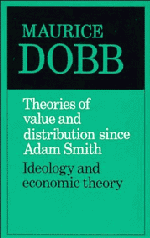7 - The ‘Jevonian Revolution’
Published online by Cambridge University Press: 12 January 2010
Summary
Jevons completed that reaction against Ricardo of which we have earlier spoken, as is implied by common association of a revolution in economic thought with his name; and although Menger could be said to have represented this break with classical tradition even more clearly and completely, Jevons was apparently more conscious of the rôle he was playing in reshunting the “car of economic science” which Ricardo had so perversely directed “onto a wrong line”. The appearance of his work only a few years after the first volume of Das Kapital makes it tempting to regard the former as a direct answer to the latter, prompted as much by contemplation of this latter-day progeny of Ricardo as the innovations of the Senior–Longfield school had been by the more jejune conclusions of the ‘Ricardian socialists’. But there is no evidence that Jevons had this consciously in mind, or even that he was aware of Marx's work: since the latter was published somewhat obscurely in Hamburg, it is highly unlikely, indeed, that Jevons had come across it, and at any rate Jevons's main ideas were formed at least ten years earlier (probably during his years in Australia) and embodied in a paper to the British Association in 1862. With the Austrians it was different, especially in the case of Wieser and Böhm-Bawerk, who was not only fully aware of the work of Marx as well as of the social backwash of Lassallean propaganda, but was even in some degree obsessed with its potential appeal.
- Type
- Chapter
- Information
- Theories of Value and Distribution since Adam SmithIdeology and Economic Theory, pp. 166 - 210Publisher: Cambridge University PressPrint publication year: 1973



